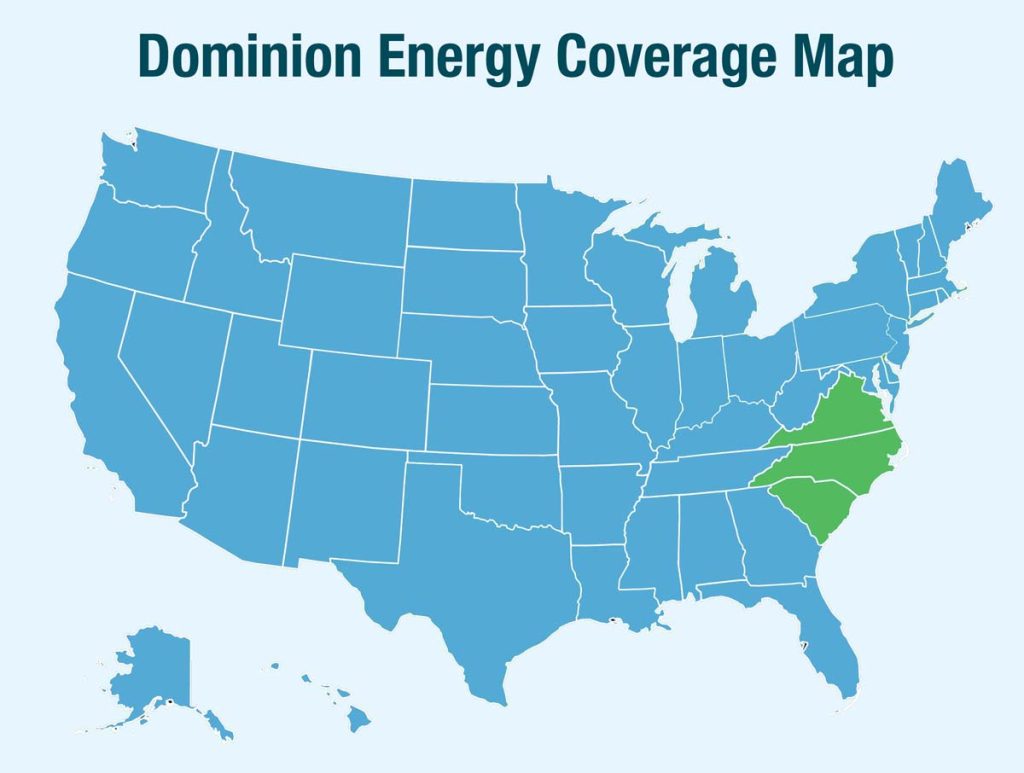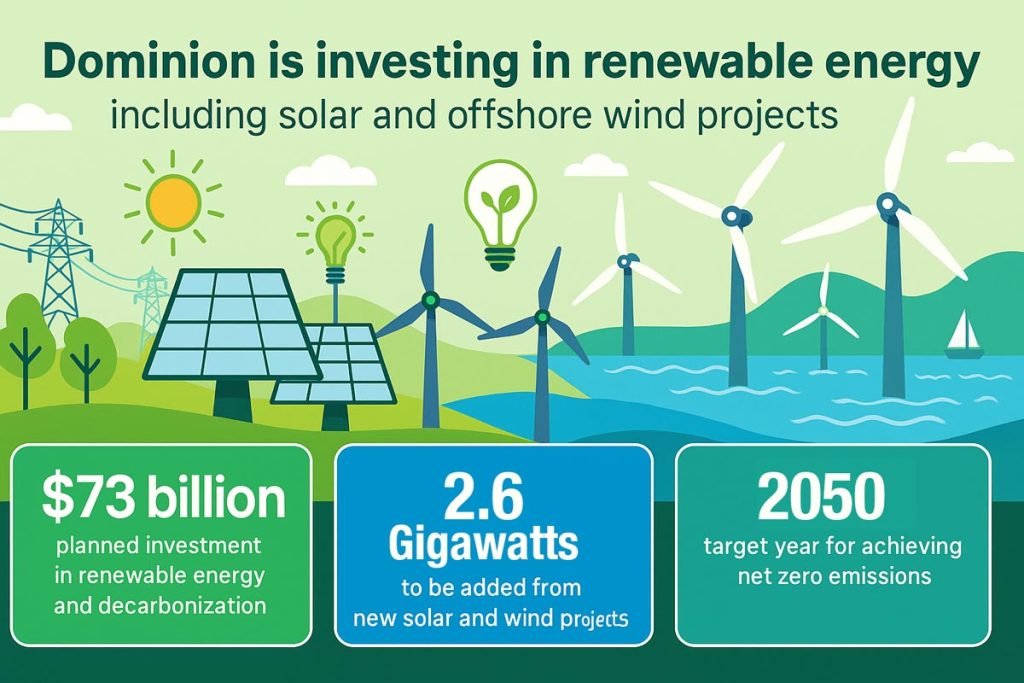- Dominion Energy is heavily investing in renewable energy projects, including the development of the Coastal Virginia Offshore Wind project, which is expected to generate 2.6 gigawatts of clean energy, enough to power up to 660,000 homes.
- The Dominion Energy mobile app allows customers to view and pay bills, monitor energy usage, and receive account updates, providing convenient account management.
- Dominion Energy offers a variety of energy efficiency programs and rebates to help customers reduce energy consumption and save on their bills.
- Customers can choose from various billing options, including budget billing and paperless billing, to manage their energy expenses effectively.
About Dominion Energy
Dominion Energy is one of the nation’s largest producers and transporters of energy, headquartered in Richmond, Virginia. While the company previously managed a vast portfolio of natural gas assets across the country, it has recently streamlined its operations to focus heavily on regulated utility services in the Mid-Atlantic and South.
For a new customer, this means you are dealing with a provider that is actively transitioning away from fossil-fuel-heavy distribution in the West and Midwest (having recently sold assets to Enbridge) and pivoting toward a sustainable, electric-focused future in the East. They are currently the third-largest owner of solar generation among utility holding companies and are spearheading the largest offshore wind project in the United States. They pride themselves on reliability and have set an aggressive goal to achieve Net Zero carbon and methane emissions by 2050.
- Calculate Your Moving Costs
- Compare Moving Companies
- Get Multiple Quotes
- Move with Confidence
Dominion Energy Coverage Areas

Dominion Energy’s electric service areas include Virginia, North Carolina, and South Carolina. Their natural gas services are available in parts of South Carolina. If you’re in Ohio, Utah, Idaho, Wyoming, or North Carolina it’s important to note that Enbridge Gas has acquired Dominion Energy’s service areas in those states.
Virginia
Dominion Energy’s largest electric service territory is in Virginia, where it serves about 2.7 million electric customers. Coverage includes:
- Northern Virginia: Including suburbs of Washington, D.C. such as Alexandria, Fairfax, and Arlington (though parts of Arlington are served by a municipal utility).
- Central Virginia: Including Richmond, Charlottesville, and Fredericksburg.
- Tidewater / Hampton Roads: Including Virginia Beach, Norfolk, Newport News, and Chesapeake.
- Southwest Virginia: Some rural counties and small towns in this region also fall under Dominion’s electric grid.
Dominion Virginia also provides natural gas service in select areas, though most of their gas operations in the state have transitioned under regional utility partnerships or subsidiaries.
North Carolina
Service is limited to the northeastern corner of the state.
Major Cities Served: Elizabeth City, Roanoke Rapids, and the Outer Banks (including Kitty Hawk and Nags Head).
South Carolina
Dominion Energy is a major natural gas and electric provider in South Carolina, with service that expanded significantly after acquiring SCANA in 2019. In South Carolina, Dominion Energy serves:
- Electricity Customers: About 753,000 customers, primarily in the central and southern parts of the state, including:
- Columbia
- Charleston
- Aiken
- Orangeburg
- Beaufort and Hilton Head areas
- Natural Gas Customers: Over 400,000 customers statewide, with coverage in:
- Columbia
- Greenville
- Spartanburg
- Charleston
- Smaller communities throughout the state
This makes Dominion one of the largest dual-service energy providers in South Carolina, offering both electric and natural gas.
Where Dominion’s Energy Comes From
If you are environmentally conscious, Dominion Energy’s generation mix is a significant selling point. They are notably less reliant on coal than many regional competitors and are heavily invested in nuclear and offshore wind.
- Nuclear (The Backbone): Nuclear power is the workhorse of Dominion’s grid, providing roughly 40% to 50% of the electricity generated for their customers. This provides a massive amount of “baseload” power that is carbon-free.
- Natural Gas: This makes up a significant portion of the remaining mix (approx. 40%) and is used to ensure reliability when demand peaks.
- Renewables (The Future):
- Coastal Virginia Offshore Wind (CVOW): This is Dominion’s crown jewel. Located 27 miles off the coast of Virginia Beach, this $9.8 billion project involves 176 wind turbines. Once fully operational (targeted for 2026), it will be the largest offshore wind farm in the U.S., capable of powering 660,000 homes.
- Solar: Dominion has one of the largest solar fleets in the country, with massive facilities across Virginia and North Carolina.
The company has committed to achieving net-zero greenhouse gas emissions by 2050, aligning with broader environmental goals. If you’re eco-conscious, Dominion offers Green Power Programs where you can opt for 100% renewable energy for a small premium.
Commitment to Net-Zero Emissions

Dominion Energy has set an ambitious goal to achieve net-zero carbon and methane emissions by 2050. The company’s investments in offshore wind, solar energy, and energy storage are central to this commitment, aligning with broader environmental objectives and regulatory mandates.
Offshore Wind: Coastal Virginia Offshore Wind (CVOW)
Dominion Energy is leading the development of the Coastal Virginia Offshore Wind (CVOW) project, which is set to become the largest offshore wind farm in the United States. Located approximately 27 miles off the coast of Virginia Beach, this project will consist of 176 Siemens Gamesa wind turbines, each with a capacity of 14.7 megawatts, totaling 2.6 gigawatts (GW) of clean energy. Once operational in 2026, CVOW is expected to power up to 660,000 homes and significantly reduce carbon emissions.
To support this massive undertaking, Dominion is investing in infrastructure, including the construction of the Charybdis, the first U.S.-built offshore wind turbine installation vessel compliant with the Jones Act. This vessel will play a crucial role in installing turbines for CVOW and future offshore wind projects.
Solar Energy Expansion
Dominion Energy is also heavily investing in solar energy across several states. In Virginia, the company plans to add up to 16,100 megawatts (MW) of solar capacity by 2035 . Notable projects include:
- Dulles International Airport Solar Farm: An 835-acre solar project featuring 200,000 panels, expected to generate enough electricity to power 37,000 homes. This initiative also includes 50 MW of battery storage and aims for completion by 2026.
- Dominion Energy contributes to carbon-free electricity in New England primarily through its ownership and operation of the Somers Solar Center in Connecticut. This 5-megawatt photovoltaic solar facility, located in Somers, Connecticut, was acquired by Dominion in October 2013. The center consists of 23,150 Kyocera solar panels spread over 50 acres, generating approximately 5,400 megawatt-hours annually, enough to power about 5,000 homes.
- Land to Solar Program: Dominion encourages landowners to lease or sell land for solar development, promoting renewable energy growth while providing financial benefits to participants.
Energy Storage and Grid Modernization
To complement its renewable energy projects, Dominion is investing in energy storage solutions. The company has completed battery storage systems totaling 48 megawatt-hours (MWh), enhancing grid reliability and facilitating the integration of intermittent renewable sources.
Outage Management: Search & Report
Dominion Energy offers robust tools for managing outages, but the contact methods differ slightly depending on which state you are in.
How to Search for Outages
The most convenient way to check the status of the grid is via their interactive Outage Map on their website. You can zoom in to street level to see if an outage has been reported in your neighborhood, the estimated time of restoration (ETR), and the cause of the issue (e.g., “Tree on line” or “Equipment failure”).
How to Report an Outage
If your power goes out, do not assume they know. Report it immediately using one of these methods:
- Virginia & North Carolina Customers:
- Phone: Call 1-866-DOM-HELP (1-866-366-4357).
- Online: Log in to your account on DominionEnergy.com.
- South Carolina Customers:
- Phone (Electric): Call 1-888-333-4465.
- Phone (Gas Leaks/Emergency): Call 1-800-815-0083.
- Online: Use the SC-specific portal on their website.
Dominion Energy Mobile App
The Dominion Energy App (available on iOS and Android) is highly rated and essential for account management. Unlike some utility apps that are just “wrappers” for a website, this app allows you to:
- Report Outages: You can report an outage directly through the app interface without making a phone call.
- Biometric Login: Sign in instantly using FaceID or fingerprint.
- Track Usage: View your energy consumption down to the day (and in some cases, the hour) to help you budget.
- Pay Bills: Set up AutoPay or make one-time payments.
Rebates, Discounts, and Incentives from Dominion Energy
Dominion offers a variety of programs to help you lower your bill, though they vary by state.
- Smart Thermostat Rewards: If you install an eligible smart thermostat (like Ecobee or Nest), you can receive an upfront rebate and annual credits for allowing Dominion to make minor adjustments to your temp during peak energy demand days.
- EnergyWise (South Carolina): This program is particularly aggressive, offering cash rebates for upgrading to high-efficiency heat pumps, sealing ductwork, or purchasing ENERGY STAR® appliances.
- EV Charging Rewards: In Virginia, Dominion offers an “Off-Peak Charging” program where EV owners are rewarded for charging their vehicles overnight rather than during the day.
- Income-Qualifying Programs: They offer “EnergyShare,” a program that provides bill payment assistance and free weatherization upgrades (like insulation and LED bulbs) to qualifying low-income residents, veterans, and seniors.
New Customer Information
If you are moving to a home served by Dominion Energy, here are a few “need to know” details:
- Connection Fees: Expect a small connection charge (typically around $15-$30) on your first bill.
- Security Deposits: If you do not have a strong credit history, Dominion may require a security deposit. However, this deposit is refundable (with interest) after 12 months of on-time payments.
- Rate Plans: While most customers are on a standard residential rate, Dominion is increasingly rolling out “Time-of-Use” plans. If you can shift your laundry and dishwashing to off-peak hours, you could save significantly by opting into one of these plans.
Dominion Energy is committed to providing reliable and increasingly clean energy to its customers. With a focus on renewable energy investments and customer-centric programs, they offer various options to help you manage your energy needs effectively.
FAQs About Dominion Energy
What payment assistance programs are available?
– Budget Billing (predictable monthly payments)
– EnergyShare (financial aid for qualifying households)
– Payment extensions & arrangements
– LIHEAP & state assistance program referrals
How can I pay my Dominion Energy bill?
– Online (DominionEnergy.com or app)
– Autopay (set up recurring payments)
– Phone (automated system or live agent)
– In person (authorized payment centers)
– Mail (check your bill for the correct address)
Enroll in Paperless Billing for convenience and to reduce waste!
Does Dominion Energy offer renewable energy options?
– Enroll in Green Power Programs (support wind/solar energy)
– Get solar rebates (for rooftop solar installations)
– Explore battery storage & EV charging incentives
Does Dominion Energy offer smart meters?
– Accurate, real-time usage data
– Faster outage detection
– No need for estimated bills
Contact Dominion to check availability in your area.
What should I do if I see a downed power line?
Call 911, then report to Dominion Energy.
About the Author
LaLeesha has a Masters degree in English and enjoys writing whenever she has the chance. She is passionate about gardening, reducing her carbon footprint, and protecting the environment.


